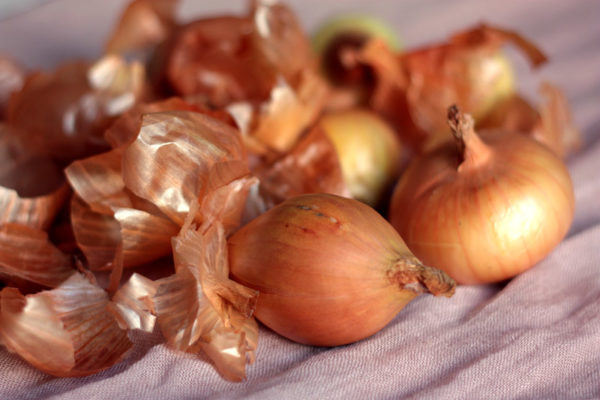Onion is an indispensable vegetable in the kitchen. It is used to prepare culinary dishes almost every day. Before applying it is necessary to "undress". Onion peel is sent to the garbage can, as garbage. But this is a unique raw material for dyeing eggs for Easter, preparing firming masks for hair, a remedy for cold and cough, and most importantly - an environmentally friendly fertilizer for the vegetable garden.
Table of contents
The composition and beneficial properties of onion peel
In the people there is a proverb: "The bow of the seven diseases". Onion peel no less useful than the vegetable itself. Its composition is unique and contains a variety of mineral and vitamin substances. Among them, carotene, phytoncides, vitamins of groups PP and B. After being introduced into the ground, all these useful elements bring great benefit to the soil and garden plants.
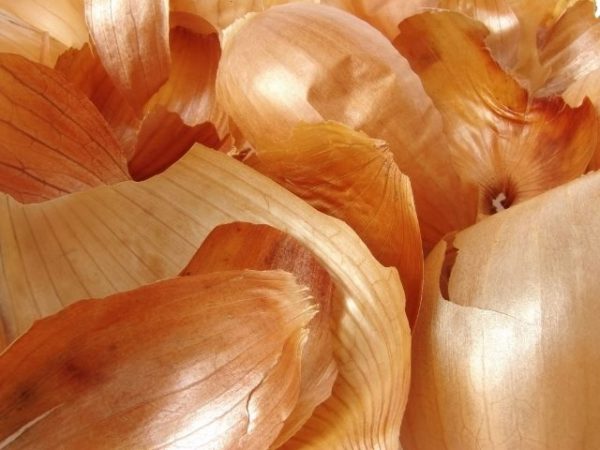
The main properties of substances included in onion scales:
- Carotene. This substance is a unique antioxidant that helps to increase the resistance of plants to various diseases. It fights perfectly with fungus and rot, being a powerful immunostimulant;
- Phytoncides. This component is located in large quantities on the surface of onion peel. This protective substance is aimed at eliminating the activity of foreign bacteria and microbes. They inhibit the activity of spores of fungi, are able to destroy single-celled organisms, such as the ciliate infusoria;
- Vitamins of group B. They are abundantly contained both in the onion itself and in its scales. Due to this they can be used to accelerate the growth of seedlings. Strengthens the root system and stems;
- Nicotinic acid or vitamins of the PP group. Very useful for stimulating the growth of vegetables and trees in dark areas. Particularly suitable for growing on heavy soils. It speeds up the processing of nitrogen into oxygen, thereby strengthening the roots and stems of plants.
Onion Husk Application
Husk is a versatile fertilizer that is suitable for both indoor and garden vegetables. There is not any difficulty in preparing a useful composition that can be prepared in the following ways:
- Boiling.
- Infusion in cool water.
- Husk application directly to the soil.
It is necessary to boil the scales for a few minutes, then the broth is cooled and infused for two to three hours. More beneficial properties remain in the fertilizer prepared on the infusion of the husk in cool water. The process is longer, it will take from one to two days.
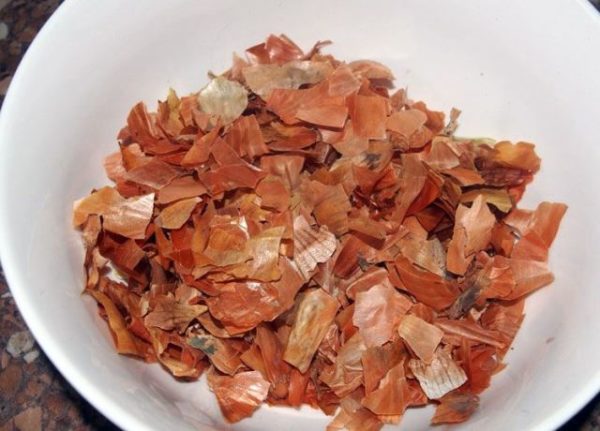
Dry scales are applied to the soil in the spring before digging. It can also be added directly to the wells before planting seedlings or seeds. To do this, it is necessary to grind and mix with ash. Such a composition not only nourishes the soil with nutrients, but also scares off pests.
Spraying against pests
Onion peel is very effective in controlling large numbers of pests. Any formulations sold in specialized stores are poisonous, so the gardener has to observe a number of activities in order not to harm his body. Onion peel is completely safe, it will not only scare away the pests, but also saturate the plants with useful substances.
The most effective decoction of onion scales to combat the following pests:
- Colorado beetle;
- Codling moth;
- Aphid;
- Thrips;
- Fleas;
- Spider mite
To prepare the broth, you need to take two handfuls of not crushed scales and pour 10 liters of warm water. Put on the fire and boil for no more than 5 minutes, avoiding a strong boil. Then remove from heat, cover and allow to stand for at least 4 hours. Before use, the solution must be diluted at the rate of 2 liters of broth per 10 liters of water.
Spraying is carried out both from a spray bottle and from a regular watering can.
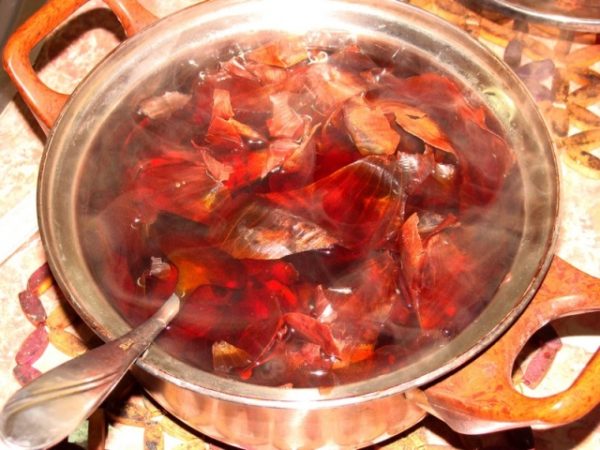
To combat thrips or spider mites, it is necessary to prepare a more concentrated solution: for one liter jar of husk you need to take 2 liters of warm water. Insist leave for two days and strain. Then dilute with water in a ratio of one to two and add a little soap. We try to process the leaves from two sides.
To combat aphids on tomatoes and cucumbers, you need to prepare the onion brew as follows: Pour 1 cup of husk with 10 liters of boiling water and let it stand for at least 12 hours. The finished decoction is filtered and applied to the plant by spraying.You can also just wash the leaves infusion. You can process the site every 4 days. If the aphid does not appear, use an onion solution for prophylaxis by spraying it with a spray bottle every two weeks.
The broth prepared in the same way is an excellent bactericidal agent.
Fertilizer for tomatoes and cucumbers
Now many are talking about the benefits of using natural fertilizers, which allow growing organic vegetables and fruits. The beneficial properties of onion peel have been used in plant growing since ancient times.
Some of the main advantages of onion peel as fertilizer:
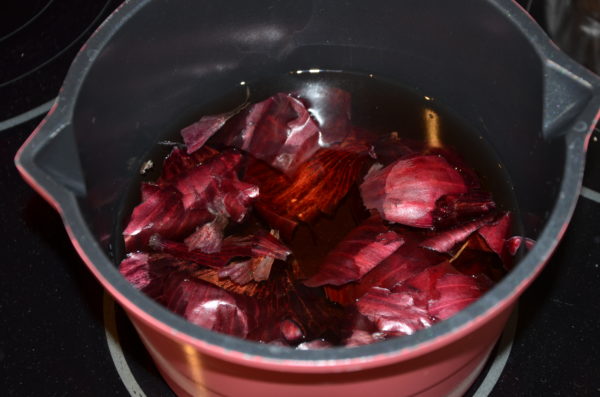
- Natural product. Completely harmless when applied;
- Do not harm the young seedlings, strengthen the root system and the stem;
- Availability. The cost of fertilizer is already included in the main vegetable - onion. So there is no need for any additional material costs;
- Ease of preparation and use;
- Rich mineral and vitamin composition.
The use of onion fertilizer is possible for any garden crops. A special effect brings watering seedlings.
For tomato infusion can be used from the moment of growing seedlings, before processing the plant during flowering and fruiting. Spraying tomato once a week accelerates the formation of ovaries. If the leaves of the tomatoes began to turn yellow, it is worth carefully processing the infusion of the bush and the problem will recede. When watering seedlings after planting in the ground, 500 milliliters of infusion is used for each well, as the plant grows, the dosage is tripled.
Onion peel is very convenient to use for feeding cucumbers, It turns out a double effect - fertilizer and protection from aphids and other pests.
For the cultivation of carrots or potatoes, chopped onion peel can be added directly to the well or ditch before planting. Plants will be reliably protected from pests and get excellent feeding.
Use for indoor plants
This is a great fertilizer for indoor plants.It is better to use onion decoction at the rate of a small handful of husk and 1500 milliliters of warm water. The solution is boiled for about 7 minutes, then cooled and filtered. And the miracle tool is ready.
It is used for spraying the surface of leaves and spillage of the upper layer.. Such processing of indoor plants will allow them to saturate them with minerals and vitamins, as well as provide reliable protection against diseases and parasitic microorganisms.
To conduct watering and processing of home flowers should not be more than once every two weeks. Such care will strengthen the plants, allow them to fully develop and grow.

Features of the use of onion scales in the garden
This useful fertilizer can be harvested throughout the year.The main thing is that the onion peel remains dry, otherwise the process of decay will begin. To store it, you can use a regular cardboard box, a grid for storing vegetables, or any other container that will provide adequate ventilation.
Husk is afraid of moisture, so you need to choose a dry place protected from direct sunlight. Carefully collecting onion scales every day, you can provide yourself with high-grade fertilizer for the entire summer season.
When preparing the solution, you need to understand that each onion variety differs in its composition of useful substances, which is reflected in the onion peel components. Therefore, it is not necessary to strive to maintain exact proportions for the preparation of infusion.
In the husk there is a special component - quartzetine, it provides its bitter taste. Infusion can be diluted as long as there is this bitterness. If it disappeared, the concentration of the solution is very low and will not benefit the plants.
The most beneficial has a freshly prepared solution, so do not store the broth for more than a day. You should not throw out the remaining meal after filtering broth, there are still a lot of useful substances. Better to dig it under fruit trees or shrubs.
